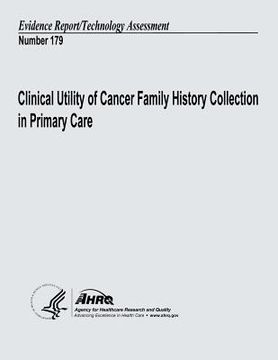Clinical Utility of Cancer Family History Collection in Primary Care: Evidence Report/Technology Assessment Number 179 (en Inglés)
Reseña del libro "Clinical Utility of Cancer Family History Collection in Primary Care: Evidence Report/Technology Assessment Number 179 (en Inglés)"
Family history reflects the combined influences of genetics, environmental exposures, and behaviors within families, and is a risk factor for some clinically important chronic diseases such as cardiovascular disease, diabetes mellitus, stroke, and several cancers. Family history reflects genomic, social and environmental risk which is shared between relatives. This 'compressed information' may provide predictive information independent of other known risk factors. Individual risk stratification systems based on family history may carry valuable predictive information for individual patients, but they need to be validated for application in routine practice. The usefulness of family history-based risk stratification systems in disease prevention depends on (a) accurate reporting and capture of family history information, (b) valid methods of risk classification, (c) effective preventive interventions to manage disease risk, and (d) evidence that the use of family history information provides incremental net benefit over and above non-family history-based alternative approaches. With the exception of accuracy of reporting, this systematic review is designed to inform all of these issues. This report, which builds on a previous evidence report on the topic of tools for collecting and interpreting family history information, addresses the clinical utility of routinely using family history information in risk assessment and prevention for breast, ovarian, colorectal, and prostate cancers in primary care. The specific research questions are: 1. Which risk stratification algorithms or guidelines delineate risk accurately, and in a clinically meaningful way? 2. For which behaviors and clinical preventive services ('interventions') is there evidence of benefits in terms of actual reduction in disease risk, and what harms, if any, have been identified? 3. For those interventions identified as being based on reasonable evidence, what is the evidence that providing information on risk status results in behavior change or increased uptake of services on the part of individual patients? 4. What are the harms or risks to individual patients that may result from the collection of family history information in itself, and/or the provision of family history-based risk information? These questions represent the links in the chain between taking family history and producing benefit: Does family history predict future risk of cancer? If so, are there interventions to reduce this risk, and do they also carry their own risks? Does a family history-based approach lead to higher uptake of preventive interventions? Are there any direct harms which arise from a family history-based approach? This review's focus is therefore firmly on the application of family history taking from general populations under the care of primary care providers such as family physicians, internists, nurse practitioners, and obstetricians. We sought to examine the capture and use of family history information as an activity practiced in primary care, where patients are not pre-selected for risk, and where the approach to capturing information is heavily influenced (often constrained) by contextual factors,6 and where the preventive interventions available are those that can be recommended by a primary care practitioner. This is distinctly different from clinical genetics assessment, where the central focus is on extensive family history capture, validation, and assessment, where the patient population is usually pre-selected for high risk status.

